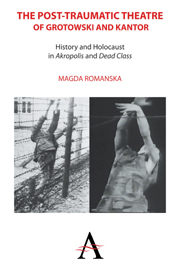 The Post-traumatic Theatre of Grotowski and Kantor
The Post-traumatic Theatre of Grotowski and Kantor Book contents
- Frontmatter
- Contents
- Foreword by Kathleen Cioffi
- Preface
- Acknowledgments
- List of Illustrations
- Introduction
- Part I Our Auschwitz: Grotowski's Akropolis
- Part II Our Memory: Kantor's Dead Class
- Chapter 22 Tadeusz Kantor: A Very Short Introduction
- Chapter 23 Dead Class: The Making of the Legend
- Chapter 24 Dead Class in Poland
- Chapter 25 The Polish History Lesson
- Chapter 26 Dead Class Abroad
- Chapter 27 On Not Knowing Polish, Again
- Chapter 28 The Visual and the Puerile
- Chapter 29 The National and the Transnational
- Chapter 30 Witkiewicz's Tumor
- Chapter 31 An Age of Genius: Bruno Schulz and the Return to Childhood
- Chapter 32 Conversing with Gombrowicz: The Dead, the Funny, the Sacred and the Profane
- Chapter 33 Panirony: “A pain with a smile and a shrug”
- Chapter 34 Raising the Dead
- Chapter 35 Dead Class as Kaddish…
- Chapter 36 Dead Class as Dybbuk, or the Absence
- Chapter 37 The Dead and the Marionettes
- Chapter 38 Men and Objects
- Chapter 39 Dead Class as Forefathers' Eve
- Chapter 40 Dead Class: The Afterlife
- Postscript
- Appendix
- Notes
- Bibliography
- Index
Chapter 35 - Dead Class as Kaddish…
from Part II - Our Memory: Kantor's Dead Class
- Frontmatter
- Contents
- Foreword by Kathleen Cioffi
- Preface
- Acknowledgments
- List of Illustrations
- Introduction
- Part I Our Auschwitz: Grotowski's Akropolis
- Part II Our Memory: Kantor's Dead Class
- Chapter 22 Tadeusz Kantor: A Very Short Introduction
- Chapter 23 Dead Class: The Making of the Legend
- Chapter 24 Dead Class in Poland
- Chapter 25 The Polish History Lesson
- Chapter 26 Dead Class Abroad
- Chapter 27 On Not Knowing Polish, Again
- Chapter 28 The Visual and the Puerile
- Chapter 29 The National and the Transnational
- Chapter 30 Witkiewicz's Tumor
- Chapter 31 An Age of Genius: Bruno Schulz and the Return to Childhood
- Chapter 32 Conversing with Gombrowicz: The Dead, the Funny, the Sacred and the Profane
- Chapter 33 Panirony: “A pain with a smile and a shrug”
- Chapter 34 Raising the Dead
- Chapter 35 Dead Class as Kaddish…
- Chapter 36 Dead Class as Dybbuk, or the Absence
- Chapter 37 The Dead and the Marionettes
- Chapter 38 Men and Objects
- Chapter 39 Dead Class as Forefathers' Eve
- Chapter 40 Dead Class: The Afterlife
- Postscript
- Appendix
- Notes
- Bibliography
- Index
Summary
Jan Kott once called Dead Class a form of Kaddish, the Jewish mourner's prayer. Jewish law requires that the Kaddish be recited by selected mourners for the first 11 months after the death of a loved one, and then on each anniversary of the death. The Kaddish is a mourning prayer recited in Aramaic that praises the greatness of God, asking him for peace for all. It never refers directly to that which it is about: death. In Hebrew and other Semitic languages, the name of God is written without vowels, as it was strictly forbidden to pronounce it. In mystical theology, the supreme experience of being, that is, the perfect name of God, is the experience of meaning of the gramma itself, “word that is written but not read” (Quere wela ketib). As Agamben explains it, “as the unnamable name of God, the gramma is the final and negative dimension of meaning, no longer an experience of language but language itself, that is, its taking place in the removal of voice.” According to Derrida, the sign stands in for the thing it signifies; by being there, the sign signifies the absence of the thing it designates. The sign thus is a pure negativity. It establishes its meaning on the basis of difference from other signs, other negativities. Thus, language is a play of negativities that negate themselves in relation to themselves, and which negate the very things they signify.
- Type
- Chapter
- Information
- The Post-traumatic Theatre of Grotowski and KantorHistory and Holocaust in 'Akropolis' and 'Dead Class', pp. 256 - 259Publisher: Anthem PressPrint publication year: 2012


